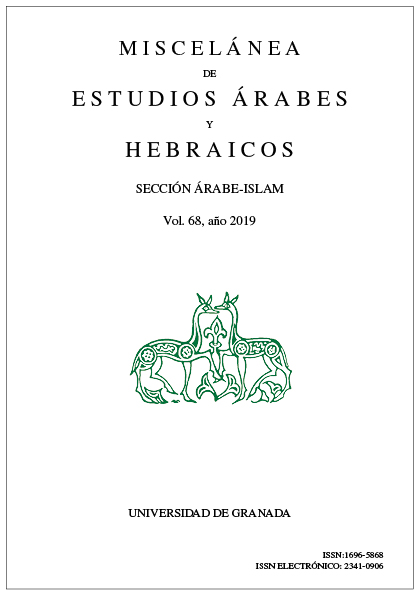Traducción intercultural. El reflejo de las nociones religiosas de qadar y rizq en la paremiología y fraseología árabes
DOI:
https://doi.org/10.30827/meaharabe.v68i0.1003Palabras clave:
Paremiología árabe, Palabras culturales, Islam, TraducciónResumen
El objetivo del presente trabajo es indagar la plasmación de las realidades culturales en hechos lingüísticos mediante el estudio de los refranes y expresiones árabes que se refieren explícitamente a los conceptos religiosos de qadar y rizq, dos palabras clave tan arraigadas en la cultura arabo islámica que dan lugar a un abundante caudal paremiológico. La exposición de estas cuestiones se abordará teniendo muy en cuenta la traducción de los referentes culturales y los equivalentes funcionales. Para ello, se ha seguido la siguiente metodología: ejemplo en árabe, traducción funcional al castellano propia de los autores y un análisis-comentario. Los resultados globales logrados en este estudio han respondido a su objetivo principal, que aspiraba a reflejar la existencia de numerosos rituales sociales, a través de la paremiología y fraseología, que los árabes aplican a la hora de afrontar los dis- tintos acontecimientos, que transcurren a lo largo de su vida. Como conclusión, se puede comprobar, una vez más la interdependencia entre la cultura y el lenguaje, haciendo hinca- pié en que una asimilación correcta de los códigos lingüísticos de una determinada socie- dad deberá pasar inexorablemente por la comprensión de los componentes culturales que subyacen a ellos.
Descargas
Descargas
Publicado
Cómo citar
Número
Sección
Licencia
Los autores que publican en esta revista están de acuerdo con los siguientes términos:
1. Los autores conservan los derechos de autor y garantizan a la revista el derecho de ser la primera publicación del trabajo al igual que licenciado bajo una Creative Commons Attribution License que permite a otros compartir el trabajo con un reconocimiento de la autoría del trabajo y la publicación inicial en esta revista.
2. Los autores pueden establecer por separado acuerdos adicionales para la distribución no exclusiva de la versión de la obra publicada en la revista (por ejemplo, situarlo en un repositorio institucional o publicarlo en un libro), con un reconocimiento de su publicación inicial en esta revista.
3. Se permite y se anima a los autores a difundir electrónicamente (por ejemplo, en repositorios institucionales o en su propio sitio web) la versión publicada de sus trabajos (versión post-print del editor) o, en su defecto, el de la versión post-print del autor ya evaluada y aceptada. Esto puede dar lugar a intercambios productivos, así como a una citación más temprana y mayor de los trabajos publicados (Véase The Effect of Open Access).
4. La revista no se hace responsable de las opiniones vertidas por los autores.















